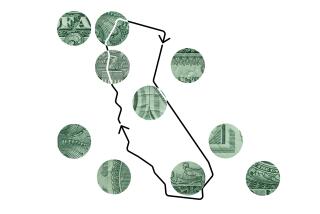Sting Videotapes Show Aides Asking for Funds
- Share via
SACRAMENTO — In the latest Capitol political corruption trial, prosecutors played a series of videotapes and audiotapes Friday revealing a former legislative aide asking for and receiving sizable campaign contributions for himself and the legislator he worked for.
In a series of secretly taped meetings, defendant Tyrone Netters, an aide to Assemblywoman Gwen Moore (D-Los Angeles), repeatedly asked an FBI informant for payments to Moore’s campaign and to a committee that Netters had set up to help him in his run for a local utility board. The government alleges that Netters extorted money in exchange for legislative favors.
On one March, 1988, videotape, Netters is shown asking then-Senate aide John Shahabian--who had become an FBI informant--for the money for himself. “I’d like to do $1,500, now. That’s what I’d like to do.” he said.
And just a week later, on March 22, Netters is shown on camera accepting a $1,500 check from Shahabian a few blocks from the Capitol, in the offices of Peach State Capital, a phony company set up as a cover for the sting.
Shahabian testified that Netters returned to the office a little more than 10 minutes later to complain that the check had bounced.
FBI agents who had come out of hiding were sent scrambling by Netters’ unexpected and angry return. But they were back with the camera rolling quickly enough to show a somewhat mollified Netters leaving the office again--assured by Shahabian that the check would be good if it were redeposited.
In the hasty arrangements for the surprise second meeting, Shahabian said, “I was telling them (the FBI) they were a bunch of knuckleheads for not having enough cash in the account.”
The playing of tapes punctuated the fourth week in the federal court trial of Netters and Darryl Freeman, a former legislative aide who briefly became a lobbyist in 1986.
Netters, 36, is facing nine counts for using his post, as an aide to Moore (D-Los Angeles), for campaign contributions and financial gain in 1986 and again in 1988. Freeman, 44, is charged with conspiracy and aiding an extortion in 1986.
The evidence presented by acting U.S. Atty. George O’Connell became at times a treatise on the influence of cash in the state Legislature.
As part of its sting, undercover FBI agents and their informants tried offering the money in exchange for support for bills that would supposedly allow the phony FBI companies to set up a shrimp-processing plant near Sacramento.
Shahabian, a onetime aide to former Sen. Paul E. Carpenter, became ensnared when he successfully arranged $20,000 in payments from an undercover agent in 1986 in the first phase of the sting. On Sept. 10, 1987, after a confrontation at the FBI office in Sacramento, he agreed to become a government informant during the sting’s second phase in exchange for immunity from prosecution.
The next day, wearing a hidden recording device, he began talking to lawmakers and aides about reviving the 1986 sting bill, which had been vetoed by then-Gov. George Deukmejian, who had been tipped off by the FBI about the undercover operation.
In testimony earlier this week, Maureen Higgins, Deukmejian’s deputy legislative secretary, testified that Deukmejian would probably have vetoed the FBI-concocted bill anyway in 1986, even if he had not been asked to do so by federal authorities. The measure, she said, was opposed by the state Department of Savings and Loan.
On Friday, state Sen. Patrick Johnston (D-Stockton), who was called as a witness for the prosecution, described in detail the difficulties of separating his official acts as a legislator and the demands on him as a politician who must collect campaign contributions to win elections.
But he said he would stop any conversation about contributions if brought up in the middle of a discussion of legislation. And he added, “I’ve never permitted my staff to do the soliciting for campaigns.”
More to Read
Get the L.A. Times Politics newsletter
Deeply reported insights into legislation, politics and policy from Sacramento, Washington and beyond. In your inbox twice per week.
You may occasionally receive promotional content from the Los Angeles Times.









